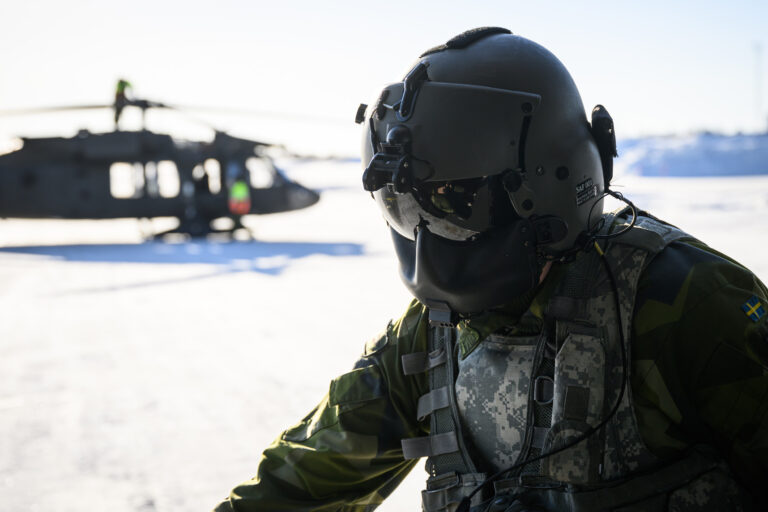The Department of Defense announced a review of its strategy for the Arctic region in response to “increasing cooperation” between China and Russia.
The Arctic strategy released on Tuesday called for increased military presence, intelligence capabilities and cooperation between the United States and its allies. It also highlighted climate change as a challenge as Arctic ice melts, making it more accessible to multiple actors.
“we, [People’s Republic of China] “China and Russia are cooperating commercially in the Arctic, China is a major donor of Russian energy development in the Arctic, and Russia and China are deepening their military cooperation, including conducting joint military exercises off the coast of Alaska,” Deputy Secretary of Defense Kathleen Hicks said.
The Pentagon said in its 2024 Defense Arctic Strategy that America’s Arctic infrastructure, built largely during the Cold War, is “facing degradation” due to thawing permafrost and coastal erosion.
Meanwhile, Russia has been strengthening its military and China has been trying to get involved in governing the Arctic, but most of the territory in the Arctic has already been claimed.
The strategy noted that it falls under the jurisdiction of sovereign nations.
The United States should strengthen its technological capabilities in the Arctic through more satellites and data, and through intelligence-sharing and information-sharing with allies, “to build operational readiness at high latitudes,” the report said.
The document highlighted the growing challenge from Beijing, which it said includes the Arctic in its long-term plans.
“Though China is not an Arctic power, it seeks to exploit changing trends in the Arctic to seek greater influence and access, to exploit Arctic resources, and to play a greater role in governance of the region,” the Pentagon said, using the acronym for the People’s Republic of China.
Chinese Foreign Ministry spokesman Mao Ning said on Tuesday that the United States was distorting China’s role.
“China is an important stakeholder in Arctic issues. China has always participated in Arctic issues based on the fundamental principles of ‘respect, cooperation, win-win and sustainability’, and is committed to strengthening cooperation with all parties involved, safeguarding peace and stability in the Arctic, and promoting sustainable development in the Arctic,” Chairman Mao said at a regular press conference in Beijing.
“The United States has distorted China’s Arctic policy and made irresponsible remarks about China’s normal Arctic activities which are in accordance with international law, which is not conducive to peace, stability and cooperation in the Arctic. China firmly opposes this,” she said.
The Arctic is increasingly becoming a focal point of strategic competition, with competition for resources intensifying as global warming causes ice to retreat and new shipping lanes to appear, said Ed Arnold, a senior fellow at the Royal Institute for Security Studies, a British think tank. Newsweek.
As global tensions rise, the idea of Arctic exceptionalism – that the Arctic is immune from geopolitical conflict – is “starting to crumble,” Arnold said.
Tensions between Russia and the United States have been rising since Russia invaded Ukraine. With Finland and Sweden joining, seven of the eight Arctic Council nations will now be members of NATO.
According to a Pentagon document, Chinese People’s Liberation Army (PLA) naval vessels “have also demonstrated the capability and intent to operate in and around the Arctic through joint exercises with the Russian Navy over the past few years.”
The Pentagon also highlighted another key concern: dual-use research in the Arctic that has both military and civilian applications. China’s three icebreakers enable “dual-civil-military research activities in the Arctic,” and the ships have conducted 13 research expeditions to “test unmanned underwater vehicles, polar-capable fixed-wing aircraft, and other areas.”
“The Trump administration is trying to get the country to accept the reality that the U.S. is in a very difficult position,” said Anne-Marie Brady, a professor of politics at the University of Canterbury in New Zealand. Newsweek The US went easy on itself in the document.
“The U.S. government is clearly very concerned about Chinese military activity in the Arctic, but the declassified strategy says very little about its scope.”
“The People’s Liberation Army is pursuing an Arctic policy similar to China’s Antarctic policy, and access to the poles is crucial to China’s military expansion,” Brady said.
“China is using dual-use activities and working with Russia to expand its military presence and capabilities in the Arctic. This directly impacts not only U.S. interests, but all other Arctic nations that are also NATO members,” she said.

Leon Neal/Getty Images
The Defense Department strategy – its first update on the region since 2019 – also says that in addition to traditional security concerns, climate reasons mean the U.S. needs to improve its scientific capabilities in the Arctic: “Climate change is making an already hostile environment even more unpredictable, and sensors and data useful for forecasting and long-term climate projections are limited.”
In a recent survey Newsweek China has been shown to be making increasing advances in Arctic science, sometimes through organizations without disclosing military ties.
Given the evolving landscape, Hicks said the strategy takes a “watch and respond” approach to the region, “supported by strong domain awareness and deterrence enabled by intelligence, surveillance and reconnaissance capabilities, collaboration with allies and partners, and joint force agility.”
“The strategy focuses on strengthening our domain awareness and Arctic capabilities, working with allies and partners, and exerting an appropriate presence in the region,” she added.
“This is not a completely new strategy or a new direction. [Department of Defense] “We have a strategy, not just for the Navy, but for the whole organization,” RUSI’s Arnold said.
The U.S. and Russian Defense Ministries did not immediately respond. NewsweekRequest for comments.
Have a story we should cover? Have a defense or geopolitics question? Contact us at LiveNews@newsweek.com.
Updated July 23, 2024 at 11:10 a.m.: This article has been updated with additional information and comment.
Rare knowledge
Newsweek is committed to challenging conventional wisdom, seeking common ground and finding connections.
Newsweek is committed to challenging conventional wisdom, seeking common ground and finding connections.

